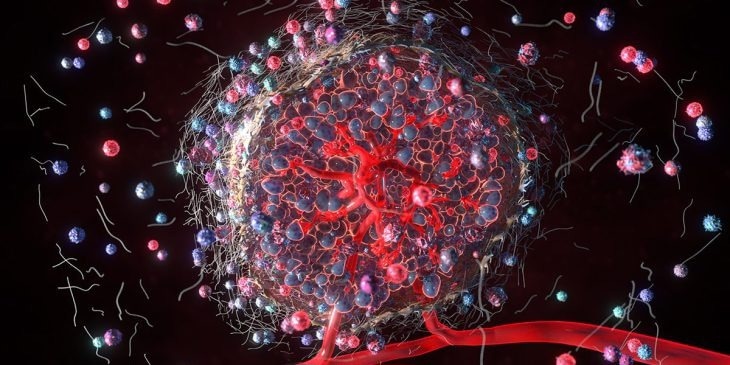Most immunotherapies that aim to increase T cell activity are ineffective in treating estrogen receptor-positive (ER+) breast cancer. A new study of invasive ER+ breast cancers led by researchers at the University of Pittsburgh School of Medicine implies that targeting a different type of immune cell called macrophages may be a more effective approach.

Image Credit: University of Pittsburgh
The study, which was published today in Nature Cancer, discovered that macrophages were the most common immune cells infiltrating ER+ invasive lobular carcinoma (ILC) and invasive ductal carcinoma (IDC) tumors. A detailed spatial analysis of tumor regions revealed distinct immune cell “neighborhoods” linked to favorable patient outcomes.
In the past, IDC and ILC were lumped into the same category and treated as the same disease. But in the last few years, strong evidence has emerged that that they are, in fact, distinct diseases. We discovered important similarities and differences in the immunological landscape of IDC and ILC, suggesting that tailored immunotherapies are needed to target these diseases.”
Dr Sayali Onkar, Study Lead Author and Senior Scientist, Mount Sinai Icahn School of Medicine
Dr Sayali Onkar carried out the research as a graduate student at the Pitt School of Medicine.
Immunotherapies assist the immune system in recognizing and eliminating cancer cells. While immunotherapies are effective treatments for several cancers, including melanoma and lung cancer, they are less effective against most breast cancer subtypes, according to a recent Cancer Discovery article led by Onkar and Neil Carleton, a student in Pitt’s Medical Scientist Training Program.
Breast cancers, particularly those that are ER+, don’t respond well to immunotherapy, so there is a huge unmet need for new therapies. By testing our hypothesis that IDC and ILC differ in their immune response, we can inform where we should focus attention for development of novel approaches.”
Dr Dario Vignali, Study Co-Senior Author and Distinguished Professor, University of Pittsburgh School of Medicine
Dr Dario Vignali is also the Interim Chair of the Pitt School of Medicine Department of Immunology and Associate Director for scientific strategy and Co-Leader of the Cancer Immunology & Immunotherapy Program at UPMC Hillman Cancer Center.
The study was made possible by Vignali’s collaboration with co-senior author Dr Steffi Oesterreich, Co-Leader of the Cancer Biology Program at UPMC Hillman and Professor at the University of Pittsburgh School of Medicine’s Department of Pharmacology & Chemical Biology, both of whom have special expertise in cancer immunology and breast cancer biology.
The researchers discovered that macrophages were the most prevalent immune cell in both ER+ ILC and IDC by analyzing the tumor microenvironment—the complex ecosystem of cells, blood vessels, and molecules surrounding a tumor—of patient samples.
To improve outcomes for patients with these diseases, we need to identify druggable targets focusing on macrophages. There is a huge lack of macrophage-targeting immunotherapies in development—the vast majority focus on T cells.”
Dr Steffi Oesterreich, Professor, University of Pittsburgh School of Medicine
Oesterreich, who also holds the Shear Family Endowed Chair in Breast Cancer Research and is co-director of the Women’s Cancer Research Center, a partnership between UPMC Hillman and Magee-Womens Research Institute
The investigators then used cutting-edge technology to map the spatial distribution of macrophages, T cells, and other immune cells throughout the tumor. They discovered distinct cellular “neighborhoods,” or cell clusters, in IDC and ILC tumors.
One type of neighborhood dominated by macrophages and CD8+ T cells in IDC was linked to higher disease-free survival in patients, implying that these immune cells cooperate to kill cancer cells.
Onkar notes, “These findings tell us that zooming out to look at the architecture of the tumor and understanding how immune cells influence each other, rather than simply looking at overall quantities of cells, is important. Targeting cellular neighborhoods within the tumor microenvironment could have a meaningful impact on patient outcomes.”
Investigating the kinds of macrophages inhabiting the tumor microenvironment, the group discovered that ILC had more tumor-promoting M2-like macrophages and very few tumor-fighting M1-like macrophages than IDC.
The investigation, according to the scientists, offers an effective resource for future research into developing novel immunotherapies or targets that focus on macrophages. Eliminating detrimental M2-like macrophages or reprogramming them to become M1-like macrophages could be encouraging ILC treatments, and a greater understanding of the partnership between macrophages and T cells in ER+ breast cancer could pave the way for combination therapies.
Source:
Journal reference:
Onkar, S., et al. (2023). Immune landscape in invasive ductal and lobular breast cancer reveals a divergent macrophage-driven microenvironment. Nature Cancer. doi.org/10.1038/s43018-023-00527-w.